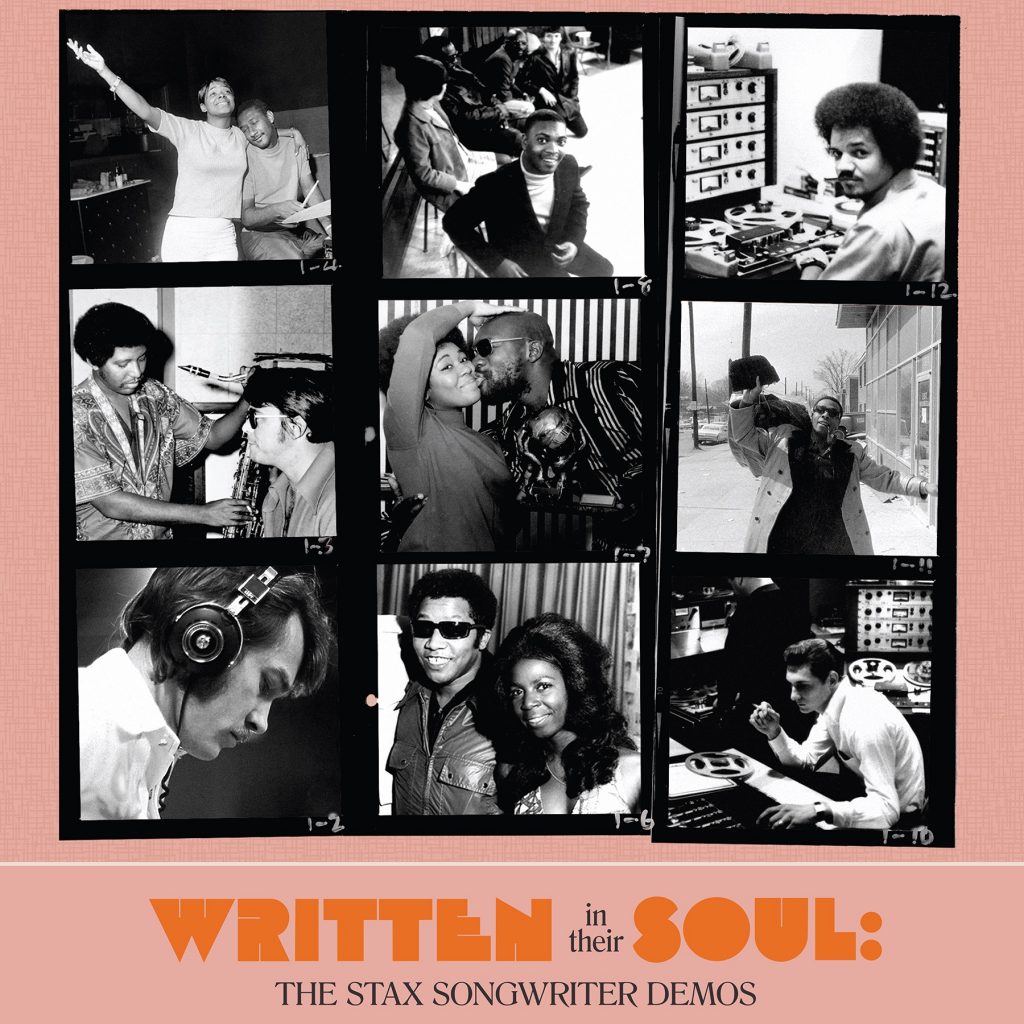In its heyday, Stax Records was synonymous with soul music’s biggest stars – from Otis Redding and Carla Thomas to Sam & Dave and the Staple Singers. But behind their iconic hits was a talented team of songwriters. Craft Recordings celebrates the work of these unsung heroes with a brand-new collection, Written in Their Soul: The Stax Songwriter Demos. Set for release on June 23 and available for pre-order today on CD and digital, the 7-disc box set includes 146 demos (140 previously unreleased) from Stax’s legendary roster of songwriters, including Bettye Crutcher, Homer Banks, and William Bell. From early sketches of classic ’60s and ’70s hits to never-before-heard songs with full-blown arrangements, Written in Their Soul offers fans a fascinating glimpse behind the scenes of the storied Memphis label.
Compiled by multiple GRAMMY®-winning producer Cheryl Pawelski and restored/mastered by multiple GRAMMY®-winning engineer Michael Graves, the songs featured on Written in Their Soul fall into three categories: demos that were released by artists at Stax or its subsidiary imprints, including Volt, We Produce, and Enterprise (CDs 1–3); demos by Stax songwriters that were released by artists on other labels, such as Atlantic and Decca (CD 4); and a trove of hit-worthy recordings that were never released (CDs 5–7). Adding context to these songs are notes by Pawelski, plus a new essay by Emmy® and GRAMMY-winning writer/producer Robert Gordon (Respect Yourself: The Stax Records Story) and Stax’s original Director of Publicity and 2x Emmy® winner Deanie Parker, who later served as the founding President and CEO of the Soulsville Foundation, which encompasses the Stax Museum of American Soul Music, among other educational organizations. Ms. Parker, who joined the Stax fold in 1962, was also a songwriter at the label.
Beginning today, fans can hear a first taste of Written in Their Soul with a demo of “634-5789 (Soulsville, USA).” Written by Eddie Floyd and Steve Cropper, the song was famously recorded by Wilson Pickett, who made it a No.1 R&B hit and Top 20 pop single in 1966. Released on Atlantic Records, the song’s title was inspired by the Marvelettes’ 1962 hit, “Beachwood 4-5789,” while the enduring tune would later be recorded by Tina Turner, Ry Cooder, and Bon Jovi.
“Demo recordings are often tossed off without inhibition, just writer and tape recorder sharing an intimate space,” writes compilation producer Cheryl Pawelski. “I love all these songs as they tumbled out for the first time. They’re filled with the joy and magic of discovering something that wasn’t there moments before. Suddenly, there it is, a song filled with the hope of finding an audience, of saying something, of moving someone.” That magic is palpable throughout Written in Their Soul, which captures some of America’s best songwriters laying down their ideas (often for the first time) on tape.
What fans might find the most striking is hearing the label’s biggest singles in their earliest incarnations. Such examples include Mack Rice’s acoustic demo of “Respect Yourself” (a 1971 hit by the Staple Singers), written alongside Luther Ingram. Gordon and Parker include an anecdote from Rice, who revealed that the song came about from a conversation with Ingram. “One of us said, ‘A guy got to respect himself out here to get anyplace, you know?’ So it hit us both at the same time – that’s a good title, ‘Respect Yourself’ is a good title.”
“I have my old guitar upstairs,” Mack continues, “I’m messing with that… And I started writing the song. The words just hit me, like God just give me the words. About thirty minutes, I had the whole song.” Fellow songwriter Bettye Crutcher suggested giving it to the Staple Singers, and an R&B classic was born. Yet, Gordon and Parker emphasize how demos (like this one) can differ vastly from the final version. “Some demos become the exact map followed and some, like ‘Respect Yourself,’ spark a new interpretation…. When Mack created it on an almost-tuned guitar, it sounds a lot more like Talking Heads or some other driving punk rock song than it does the epitome of the Staple Singers’ message music.”
Another fascinating example is Henderson Thigpen’s “Woman to Woman,” which became a signature hit for Shirley Brown in 1974. The idea for the song first came to Thigpen when he heard his wife talking about two women fighting over the same man. “When two men get serious,” Thigpen recalled, “they say, ‘Let’s talk man to man,’ so I thought of these ladies saying, ‘Woman to woman, let’s hash this out.’”
Gordon and Parker point out that the “Woman to Woman” demo is notable in that it is voiced by a male artist, but written from a female perspective. This, they say, “is an expression of a great songwriter’s skill – the ability to inhabit any character, even those not of their gender. While it was a matter of economics for the songwriter to sing across gender boundaries – if the writers brought in an outside vocalist, they’d have to pay them or have a fee taken from their royalties – the real achievement is the writers’ ability to so comfortably imagine themselves as someone else.”
Not all of the demos stray far from their final versions – in fact, fans may recognize some songs immediately. Homer Banks’ demo for “(If Loving You Is Wrong) I Don’t Want to Be Right” (written with Carl Hampton) is a prime example. Originally intended for the Emotions, the song was shelved, only to be discovered two years later by Luther Ingram. The singer-songwriter, who stayed true to Bank’s demo, turned the song into one of the biggest hits of 1972.

Gordon and Parker note that the strength of this demo gave the songwriting duo greater creative responsibilities. “The similarity between [the] demo and Luther’s final release was strong enough to push Homer and Carl into taking more control of the sessions. ‘We found other producers were literally copying the demos and having hits,’ Homer [recalled]. ‘So…we simply decided that we were going to produce!’”
Another hitmaking duo, David Porter and Isaac Hayes is also represented in this collection, leading a sweetly harmonized demo of “You Make A Strong Girl Weak,”written for and performed by one of the few girl groups at Stax, Jeanne & the Darlings. While the trio never released the song, it was issued in 1965 as a B-side by the short-lived group, the Premieres.
Stax was also home to several female songwriters – a rarity at that time. One of the label’s first big stars, Carla Thomas, was a prolific writer who penned her debut hit, “Gee Whiz (Look at His Eyes),” when she was just 15. Thomas’ work is exemplified here on multiple demos – the majority of which she would record herself – as well as several unreleased songs, including “Let’s Be Sure” and “It’s Up to You.” In 1964, while under contract at Atlantic Records, Thomas also scored a hit with the Deanie Parker/Steve Cropper tune, “I’ve Got No Time to Lose,” the demo of which is featured in this box set. Some of Parker’s unreleased work is also highlighted, including demos of “Spin It” and “Nobody Wants to Get Old” with Mack Rice.
Among Stax’s most prolific songwriters was Bettye Crutcher, whose songs in this collection include solo compositions as well as collaborations, including works with her hitmaking team We Three (featuring Homer Banks and Raymond Jackson). But Crutcher had plenty of challenges to overcome, explains Parker. “She realized that there were barriers, that the writers had turf, and to be a woman in that environment was extremely difficult.
Crutcher, who passed away last October, told Gordon and Parker, “These guys just didn’t want to accept a girl coming in there doing what they were doing… I really was going to have to win them with my work, they were not going to give me any edge.” Written in Their Soul offers more than two dozen demos by Crutcher – a testament to her talents and tireless work ethic. Adds Parker, “I’ve never seen anybody who could write as many songs in one sitting as Bettye – she was like a machine!”
In the late ’60s, when Stax split with Atlantic Records and became an independent force, that productivity helped keep the label afloat, as Crutcher penned a string of hits for newcomers like Johnnie Taylor and the Staple Singers. The latter group, which is represented throughout Written in Their Soul, performs a particularly powerful demo of “Top of the Mountain,” written by Crutcher and Marvell Thomas. The stripped-down recording, which showcases Mavis Staples’ powerful vocals, appeared on the group’s 1968 Stax debut, Soul Folk in Action. Another demo from that album, the William Bell/Booker T. Jones-penned “Slow Train” (performed by Bell) is another standout track.
Other highlights from Crutcher’s rich collection of work include the previously-unreleased feminist anthem by We Three, “Too Much Sugar For A Dime.” Written In Their Soul includes two versions of the song: a raw demo, performed by Homer Banks, followed by a flashier rendition by Crutcher that features a full band, backup singers, and supremely funky guitar licks by Bobby Manuel, who frequently collaborated with the songwriter. Manuel and Crutcher also shine in the full-band demo for “All Day Preachin’,” which was recorded by the Soul Children in 1972.
While it is thrilling to hear the early workings of classic Stax tracks, an equal portion of Written In Their Soul is devoted to the songs that never made it out into the world. Many of these tracks are fully-realized studio recordings that were sent to publishers for copywriting purposes. In addition to the previously-mentioned unreleased demos, highlights from this section include two tracks featuring Otis Redding sound-a-like, Willie Singleton. Working with Henderson Thigpen and his team, the Rochester, NY singer performed the songs “Somewhere in Somebody’s Heart” and “Love Treaty,” both of which could have easily been soul classics. Other notable selections include would-be hits that were written and performed by stars like Frederick Knight (“I Like the Way You Groove Me”), Eddie Floyd (“Don’t You Know I’m All Alone” and “‘Till You’ve Been Loved By Me,” both collaborations with Steve Cropper), and William Bell (“It’s No Secret,” written with Booker T. Jones).
Looking back at the breadth of demos collected here, Parker marvels, “This music has lasted over fifty years, and it’s still being studied, emulated, enjoyed. It has earned the right to become a tool used to teach a new generation: Culture. Music. Arts. Man’s humanity to man. There’s so many lessons to be learned from these demos, from the Stax vault, from the songwriters at Stax…. But every great song starts with something that hits you.”


